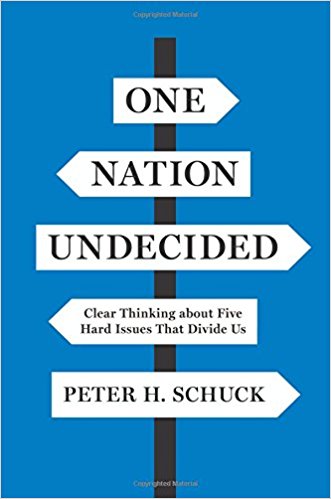
Three years ago in this magazine, I praised Peter Schuck’s Why Government Fails So Often, calling it one of the most important books of 2014. Based on that book, I had high expectations for his latest, One Nation Undecided: Clear Thinking about Five Hard Issues That Divide Us. Though not quite as good as his 2014 book, One Nation Undecided is, nevertheless, quite good. The book gives detailed background on the facts and analysis of five controversial U.S. issues: poverty, immigration, campaign finance, affirmative action, and religious exemptions from government policies. Whatever your views on these issues, it’s important to know the facts. Reading his book carefully made me, a policy wonk, realize how little I knew about four of them and that I didn’t know quite as much as I thought I knew about the fifth, immigration.
In Why Government Fails, Schuck laid out in exquisite detail the ways that government fails, which led me to wonder why he considers himself a moderate rather than a libertarian or classical liberal. The fact that he’s not a libertarian shows throughout his latest book. He seems overly confident about government officials’ ability and willingness to craft effective policies on the five issues he addresses in this book. That being said, Schuck generally lays out the tradeoffs clearly, and sometimes both his reasoning and his conclusions will hearten a libertarian.
To his great credit, Schuck almost never pulls his punches and virtually never fights dirty. Moreover, even if all Schuck presented were the facts, a public discussion informed by those facts would be head and shoulders above what we hear and read in most forums.
This is from my recently published book review “Great Background on Controversial Issues,” Regulation, Summer 2017.
An excerpt on poverty:
Of the five issues he discusses, Schuck, the Simeon E. Baldwin Professor of Law Emeritus at Yale University, devotes the most space to U.S. poverty. He points out that many important social changes since 1965 distort “and vastly overstate” the current poverty rate in America. If we include noncash government benefits such as food and housing, if we take account of the Earned Income Tax Credit, and if we use a more realistic measure of inflation than the Consumer Price Index, then we would conclude that the 2013 poverty rate was not the reported 14.5%, but, rather, 4.8%. Moreover, he notes, the official double-digit poverty rate treats cohabiting couples differently than married ones. Treating them the same “would lower the poverty rate even more.”
Also, I point out in the review that in my views on immigration, I, a pro-immigration economist and an immigrant, am closer to the 19th-century Know-Nothings than I had thought, although for somewhat different reasons than theirs.

READER COMMENTS
Andrew_FL
Jun 16 2017 at 2:13am
[Comment removed. Please consult our comment policies and check your email for explanation.–Econlib Ed.]
Jon Murphy
Jun 16 2017 at 8:40am
Sounds like an interesting book. I’ll have to add it to my list, which at its current level and my pace means I’ll get to it sometime in the year 3045.
David R. Henderson
Jun 16 2017 at 10:50am
@Jon Murphy,
I’ll have to add it to my list, which at its current level and my pace means I’ll get to it sometime in the year 3045.
I hear you, bro. One of the most delicious aspects of my coming retirement that I look forward to is getting back to reading a book every week or two rather than every 6 weeks. One of the biggest costs to me of graduate school, where you now are, was losing the habit of reading books. I’ve never got totally back to it.
David R. Henderson
Jun 16 2017 at 10:52am
P.S. to Jon Murphy,
If you don’t have time to read the whole book, read my review. It does hit most of the highlights and tells you where you might want to go in the book to learn more without reading the whole thing.
But with your limited time, if you want to read a book by Schuck, read his magnificent 2014 book.
Jon Murphy
Jun 16 2017 at 12:08pm
@Prof. Henderson-
I will definitely be reading your review. I’ll probably read the book sometime in the relatively near future; it may be applicable to my research.
Comments are closed.